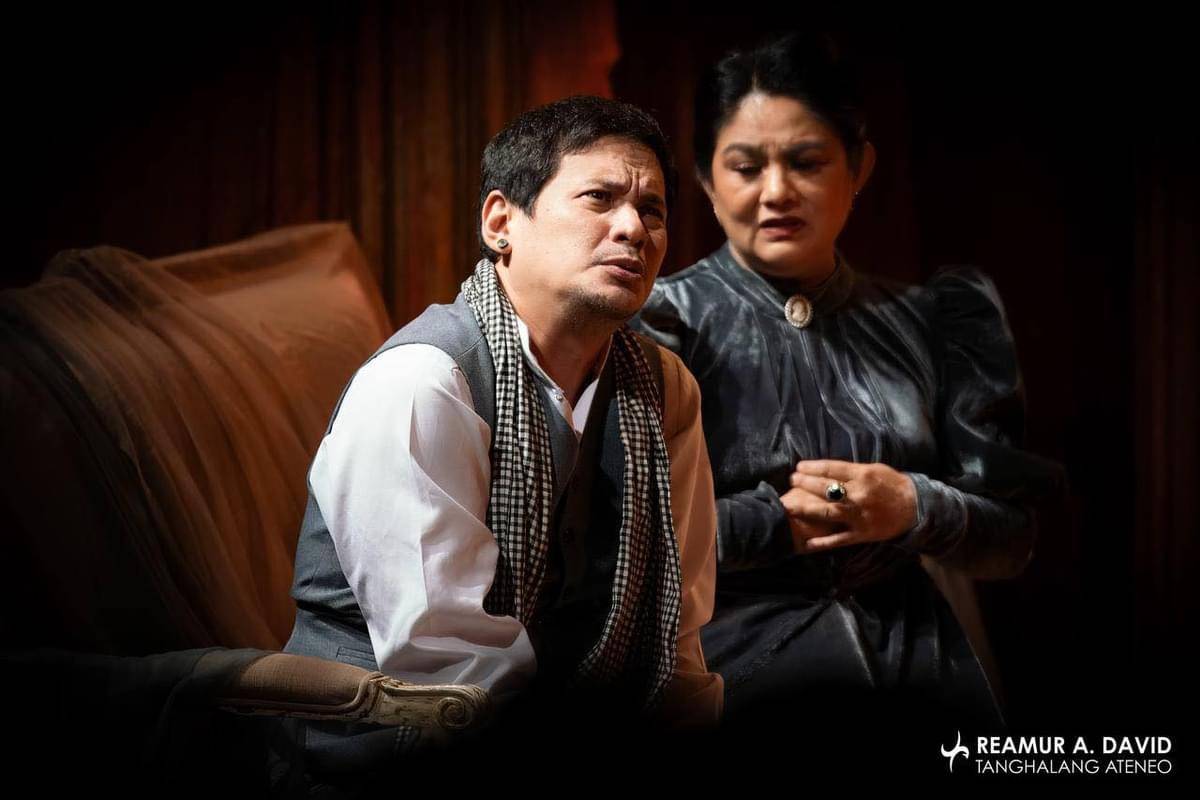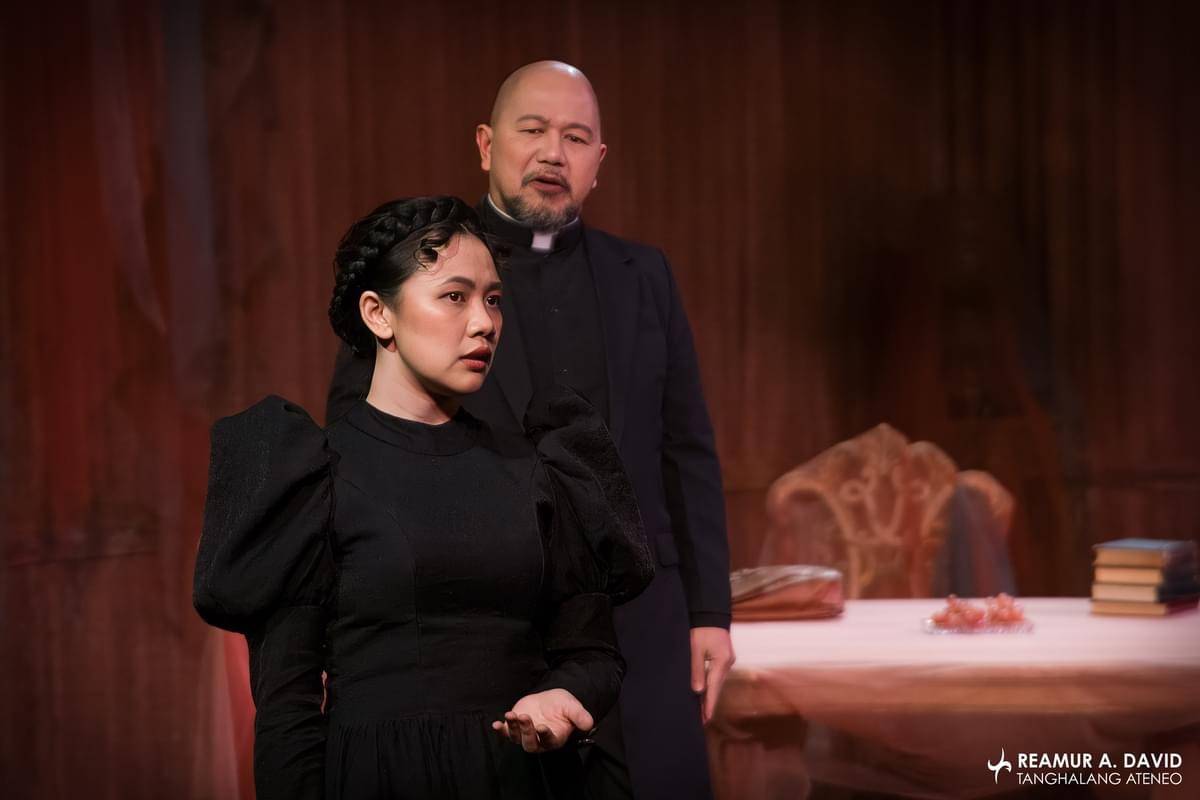‘Mga Multo’: Classical theater done the good old-fashioned way

Classical theater doesn’t always have to recontextualize itself for modern audiences. There is value in older texts being presented more or less as they are—and not to evoke empty nostalgia or impose contemporary allegories.
Tanghalang Ateneo’s “Mga Multo,” which just had a two-weekend run at the Doreen Black Box Theater, Areté, Ateneo de Manila University, Quezon City, may have been a Filipino translation of Henrik Ibsen’s 1881 play “Ghosts,” but it felt like a work successfully reanimated in its original skin.
As intimidating as that might sound, its faithfulness to tradition wasn’t a barrier for entry, but a potent reminder of how issues of the past only ever seem to morph into issues of the present.
“Mga Multo” follows the household of Señora Elena Alvino (Miren Alvarez-Fabregas), whose genteel lifestyle buckles under the weight of long-kept secrets following the return of her son Oswaldo (Yan Yuzon).
Hauntingly designed and performed with gradually increasing intensity, the production’s elegance is only matched by the beauty of its writing—giving the text new ways of articulating the hypocrisies of polite society.

All set within one room, the two-and-a-half-hour show still wasn’t left wanting in visual splendor. Much of this was thanks to how Gino Gonzales’ production design draped everything in translucent cloth, making the setting feel abandoned even as the characters paced across the stage.
Even more impressively, Monino Duque’s lighting pierced through each layer and made it seem as if paint was running off every tableau.
Even the characters appeared to shift their appearance in the right light; Jean Pierre Reniva dressed the performers in sleek black and dark velvet, blending them into the old-world texture of their surroundings.
Hurricane of energy
In contrast to the set’s grim tone, “Mga Multo’s” five actors brought a hurricane of energy with them into the room. Alvarez-Fabregas was its anguished centerpiece, her Señora Alvino growing more and more horrified at how little control she actually had and how much emotional damage she had failed to account for.
Joseph dela Cruz’s self-righteous Pastor Mande became a constant presence—not as a reassuring authority figure, but as a vulture looking for the next person to moralize to. Yuzon’s Oswaldo carried himself with the air of someone still merrily drunk on the wonders of his travels, which only really numbed him from his own private suffering.
Then there are the Estraños: daughter Regina (Sabrina Basilio), who works as Señora Alvino’s staunchly dignified maid, and father Jacobo (Mark Aranal), seemingly pitiable but always seeking good fortune for himself.

These two performances ultimately surprised the most. Basilio’s passive annoyance grew into heartbreaking indignation the more that Regina was dragged into the Alvinos’ drama, and Aranal’s incredibly sympathetic approach to Jacobo changed the character from morally questionable con artist to just a man driven by desperation. Both these performances filled out the world beyond the Alvino estate, bringing an urgency that grounded everyone around them.
Intense vision
Like his cast, director Ron Capinding also brought an unexpected liveliness, often having the characters speak out toward the audience, as if searching for help or making their case to an unseen jury. Capinding’s intense vision of Ibsen led to moments that chilled to the bone—with the grand finale becoming a disturbing spectacle, as the Alvinos’ chickens came home to roost.
At the same time, instances when things were meant to shock weren’t always convincing. The act one finale, for example, hid its reveal offstage, giving us a muted impression of what horrified these characters, rather than letting dread creep into the entire house.
Still, whether or not every scene in “Mga Multo” left its intended impression, the play remained captivating to listen to, even in moments of tentative calm. The script by Capinding and Guelan Varela-Luarca was a masterfully translated celebration of language, wonderfully old-fashioned but never impenetrable.
The complexity of the dialogue certainly invited satirical readings: that all the Alvinos’ flowery words and intellectual literature couldn’t mask the stench of their past actions.
But even taken at face value, the writing was a joy—playful and musical in its rhythms, and pointed and daring in its content.It’s true that the provocative subject matter in “Mga Multo” might not nearly be as scandalous to viewers today: incest, euthanasia, moral corruption within the Church and among the upper class.
But this production’s aim wasn’t to reignite outrage, but to recognize how current Ibsen’s concerns are about the dangers of keeping up appearances to preserve one’s wealth, status or reputation.
We in the 21st century can pretend that we’d be more careful or self-aware, but when so many of us still treat families and religious communities as completely sacrosanct, we’re just as vulnerable to inviting all this contamination into our homes. The ghosts eventually catch up.
By Emil Hofileña

















